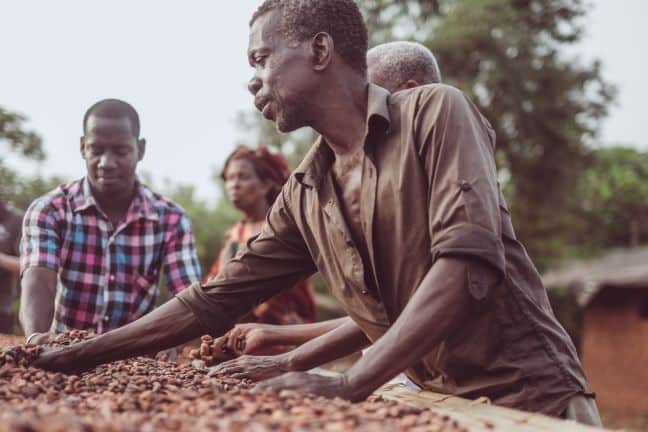Embedding Human Rights in the Chocolate Industry
Featured Members

The journey a chocolate bar takes to reach your pantry can be a long and arduous one. It involves an intricate chain of people responsible for the product you enjoy: the grocer who sold it, the driver that transported it, the worker who packaged it, the chocolate maker who oversaw the production, and the farmers that grow the key ingredient – cocoa beans.
As the world’s largest food and beverage company, Nestlé understands the power of their value chain and the impact they have on the communities where they operate. Cultivating cocoa can present unique human rights challenges, such as de-forestation, child labor risks, and incomes below poverty lines for farming households. That’s why the company is laser focused on putting people and human rights at the center of their work transforming the farming practices at the heart of the food system.
Nestlé embarked on the development of their human rights strategy 15 years ago, beginning with an analysis of policies and risks across operational geographies in 2008. Since those early days, more than 250,000 employees have been trained on human rights and nearly 160,000 children have received support through the Child Labor Monitoring and Remediation System (CLMRS). By 2025, all their cocoa will be sourced sustainably through the Nestlé Cocoa Plan.
Building on this progress, Nestlé has developed a comprehensive human rights framework. By the end of 2022, they will release detailed action plans across ten human rights issues, identified as those at risk of the most severe negative impacts on the people and communities where they operate:
• Child labor and access to education
• Forced labor and responsible recruitment
• Living income and living wage
• Gender equity, non-discrimination and non-harassment
• Safety and health at work
• Freedom of association and collective bargaining
• Right to water and sanitation
• Indigenous Peoples and Local Communities’ land rights
• Data protection and privacy
• Right to food and access to nutritious, affordable and adequate diets
The work to address many of these issue areas is already well underway, with several pilot programs in place demonstrating significant impact for the communities where cocoa and other key raw materials are grown.
Most cocoa-related child labor risks involve children supporting their parents on family farms, who are often unaware this – in certain circumstances – counts as ‘child labor.’ Community awareness training is an important first step, but to track their supply chain effectively, Nestlé launched in 2012, the child Labor Monitoring and Remediation System (CLMRS) in partnership with the International Cocoa Initiative (ICI). The CLMRS is embedded in their cocoa supply chain in order to identify, address and prevent child labor risks. It is now perceived as a leading tool and a new standard in the industry.
BETTER FARMING: REGENERATIVE AND SUSTAINABLE PRODUCT PIPELINES
Putting people and human rights at the center of their work is fundamental as Nestle works to address climate change. While much of the focus on the transition to sustainable practices often focuses on the energy industry, agriculture both contributes to climate change and is affected by climate change.
In 2021, Nestlé announced its ambition to advance regenerative food systems at scale. A regenerative food system aims to protect and restore the environment, improve the livelihoods of farmers, and enhance the well-being of farming communities. It requires taking climate action that drives equity throughout the value chain to enable a just and equitable transition.
The company believes it can have the greatest immediate and long-term impact by first prioritizing farming in its regeneration efforts.
While it’s critical to change farming practices to prioritize ecosystems and regenerate our land, an equitable transition means that farmers need support as they navigate this transition. Nestlé helps farmers by promoting good agricultural practices (such as cocoa trees pruning) and encouraging agroforestry and income diversification. Nestlé is also helping to finance farmers’ investments in capital and equipment, customized to each farmer’s needs and opportunities. Importantly, the company offers financial incentives to reward farmers for their positive impact on the environment and on local communities. This is on the top of the price premiums paid to farmers for certified cocoa.
BETTER LIVES: CLOSING THE LIVING INCOME GAP
Incentivizing farmers to adopt sustainable practices is just one step on Nestlé’s journey to a just transition. A living income is a human rights issue that plays an important role in building the resilient communities that make a positive contribution to a sustainable global food system.
Insufficient income is often a motivating factor for parents to send their children to work instead of
to school – families need the extra income their children provided to survive.
CEO Mark Schneider recalls, “When I first visited a community school in Côte d’Ivoire, I met the mother of a recently enrolled student. She told me that she was happy to have her daughter in school… as long as their income could afford it. It was a rational calculation for them, and it made our mission clear.”
Nestlé’s Income Accelerator Program aims to help close the living income gap by embedding sustainable practices across four key areas: enrolling all children six to sixteen in school, implementing good agricultural practices that increase crop productivity, performing agroforestry activities to increase climate resilience, and generating diversified incomes for families.
The program rewards cocoa-farming families for practices that help them increase their incomes, benefit the environment, and build a more resilient community. Participants receive financial incentives that help them build their income and keep their children in school.
Incentive payments also contribute to gender equity because payments are divided equally between the farmer and the farmer’s spouse and paid directly to the household using mobile payment. That split creates more ways that the money is reinvested in education and community benefits. Ten thousand cocoa-farming families are currently enrolled in the income accelerator program in Côte d’Ivoire, and Nestlé plans to expand the program to reach 160,000 families globally by 2030.
BETTER COCOA: ENHANCING THE SUPPLY CHAIN
Cocoa is largely grown by smallholders. Tackling deforestation and ensuring supply chain traceability are both critical to ensure the health of these communities and long-term productivity of the product.
Deforestation is a major issue in Côte d’Ivoire and Ghana, which together produce nearly two-thirds of the world’s supply of cocoa. What’s more, plants produce better crops when grown in the shade. Nestlé encourages farmers to plant more shade trees to protect their crops from heat stress and excessive rainfall.
By year’s end, Nestlé’s efforts will aim to distribute 2.8 million shade trees to these communities, which improve water management, local biodiversity, carbon sequestration, and provide an additional income source for farmers.
Supply chain traceability is another critical effort when managing widely distributed suppliers. As part of their efforts to improve cocoa sustainability, Nestlé will transform the global sourcing of cocoa to achieve full traceability and segregation of their cocoa products from origin to factory. This will help transform the supply chain of Nestlé and the broader industry. Nestlé will introduce a range of products with cocoa sourced from this innovation program, offering consumers the opportunity to support the improvement of the families’ livelihoods and the protection of children. This will start with a selection of KitKat products in 2023.
A ROADMAP WITHOUT BORDERS
These are just a few ways the company has already begun to implement its human rights framework actions. This holistic approach to human rights is novel in its scale, detail, and transparency, but Nestlé would describe it as a map without borders as they continue to learn and adapt their approach across the business.
The company recognizes the need for transparency and due diligence. Nestlé will share their progress and their challenges, and the important lessons learned in annual reports so others can embark on similar journeys.
Feeding the world for generations to come calls for a proactive strategy to operate safely, sustainably, and profitably in the midst of today’s challenges. Chief Executive Mark Schneider explains, “Whether in our personal lives or in business, doing only what is required or expected is generally unsatisfying. If your plan of action means doing the bare minimum, the status quo is the likely result. This is how businesses become irrelevant or lose market share as the world speeds by.”

